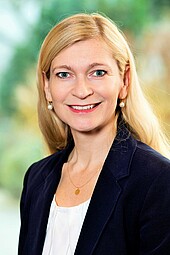In 1995, the first dual study program in Rhineland-Palatinate was launched with the development and founding of the degree program "International Business Administration in Practice", or BIP for short. The model project, which was unique in Germany at the time, was developed in partnership between the then Ludwigshafen University of Applied Sciences, the Chamber of Industry and Commerce, the vocational school for business and BASF. This year, the program is celebrating its 30th anniversary.
Viktoria Rüger, Vice President People Services EMEA, BASF Services Europe GmbH, was one of the first students on the new program. She started in the second cohort of students and successfully completed her double degree in 2000. Today, as Vice President People Services, Viktoria Rüger is responsible for HR Service Delivery at BASF for EMEA (Europe, Africa and the Middle East) and commutes between Berlin and the company headquarters in Ludwigshafen. She is still closely associated with the university as a member of the board of trustees and lecturer. In this interview, Viktoria Rüger talks about her time as a pioneering student, internationality and professional practice as pillars of the degree programs and her personal view of challenges in today's professional world.
Back then, you were one of the first to take on the risk of a new degree program. What made you choose this particular program back then?
Viktoria Rüger: The study program was something special in my eyes. The close connection to an attractive company, the stays abroad and also the demanding selection process impressed me. So after I was accepted, I decided to leave beautiful Bavaria and move to Ludwigshafen.
Were your expectations met?
The overall package of the degree programs delivered what it promised, we made great friends in the study group and built up a network at BASF or took advantage of the excellent combination of practice and theory at another company. I would say I can answer the question with YES!
What experiences from your time as a student have particularly benefited you in retrospect?
It was a really long time ago. If I think back, the different teaching methods in Germany and the USA probably brought me the furthest. It was extremely enriching not just to solve problems, but to think in terms of case studies. In addition, the sheer volume of content and requirements. I believe that I learned to prioritize here.
Then as now, BASF was one of the main pillars of the program. In your role at BASF, do you actively recommend the BIP program to promising young employees?
I do that if it fits in with their CV. Most of our young employees are in training or have already completed their studies. They need to be approached earlier. I promote the degree programs and keep in touch with the students. One really nice effect is that employees see this option for their children who are about to complete their A-levels and ask about it or ask for an interview.
In addition to professional practice, internationality is a BIP characteristic. Did you opt for the integrated semester abroad in the USA or the internship abroad?
I opted for the semester abroad. That was immediately clear. Pursuing the MBA degree and studying in the USA was important to me.
As an alumna, but also as an expert in the field of human resources, what general advice would you give to today's (BIP) students?
Today's students are much more experienced in many things than we were. Stiff learning, presentation and communication methods are a thing of the past. Technical possibilities have opened up a lot, and not just in this area. At the same time, however, this also increases the pressure on the individual. Completing this course requires a high degree of discipline and willingness to learn - in every respect. My first piece of advice is to maintain this willingness to learn and curiosity. My second piece of advice is to pay attention to your heart and the meaning behind your work. Constant change is here to stay, often in a direction that we would not have chosen. Those who know and can use their skills will always find the right sphere of activity and will also be able to inspire others.
The BIP program has evolved over the last 30 years: From "International Business Administration in Practice" has become "Business and International Programs" with the two degree programs IBA and IBAIT, the number of corporate partners has increased and the international university network has continued to grow. How do you see the development of the program from a business perspective?
I see a lot of opportunities here: using networks, contributing experience and getting to know new perspectives is always helpful. Of course, you can ask yourself whether it is still as tailor-made as you once thought it would be as a company. At the same time, it may simply no longer be as important. The aim is to grow an idea and do the right thing for well-trained young talent. For the metropolitan region and far beyond.
As a lecturer and member of the Board of Trustees, you are still closely associated with the university. Is there anything else you would like to say to the university management, your old Department or your former course director?
Please keep up the good work! Always look to the future. I am impressed by the future orientation and willingness to change. The way the university and the Department have developed in recent years is enormous. This shows how serious the university is - the contemporary promotion of talent and the consistent development of students into a competitive job market. The university is thus an important partner for companies and also sets standards for practical education.
Thank you very much!
Interview: Dr. Elena Wassmann



